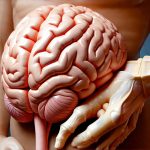Our bodies are remarkably interconnected systems. What happens on an emotional level doesn’t stay confined to our minds; it ripples through physiology, impacting everything from hormone balance to immune function. One particularly sensitive area where these connections manifest is the digestive system. Many people experience periods of discomfort—bloating, constipation, indigestion—that aren’t necessarily attributable to dietary issues or medical conditions. Often, these are signs of digestive sluggishness – a functional slowdown rather than an outright disease – and increasingly, research and clinical observation point to emotional overload as a significant contributing factor. Recognizing this link is the first step toward restoring both digestive health and emotional wellbeing.
This isn’t about blaming emotions for physical symptoms; it’s about understanding how our bodies respond to stress and overwhelm. Modern life presents constant stressors – deadlines, relationship challenges, financial worries, information overload – that keep our nervous systems in a near-constant state of activation. Chronic activation disrupts the delicate balance needed for optimal digestion. When we’re stressed, our body prioritizes survival mechanisms over non-essential functions like efficient nutrient absorption. This can lead to a vicious cycle: digestive issues contribute to stress, and stress exacerbates those issues. The goal is not to eliminate stress entirely – that’s unrealistic – but to manage it effectively and minimize its impact on our gut health.
The Gut-Brain Connection Explained
The relationship between the digestive system and the brain isn’t a one-way street; it’s a complex, bidirectional communication network often referred to as the gut-brain axis. This axis involves direct physical connections (like the vagus nerve), chemical signaling (neurotransmitters and hormones), and even the microbiome – the trillions of bacteria residing in our gut. The vagus nerve acts as a major highway between the brain and the gut, transmitting signals in both directions. When we experience stress, the brain sends signals down the vagus nerve to the gut, slowing down digestion. Conversely, the gut sends information back to the brain about the state of our digestive system, influencing mood and emotional responses.
This constant communication explains why anxiety can manifest as “butterflies” in your stomach or why a stressful event can lead to diarrhea. But it also highlights how gut health can impact mental wellbeing. The microbiome plays a crucial role here. A healthy, diverse microbiome produces neurotransmitters like serotonin (often called the “happy hormone”) which directly influences mood. Conversely, an imbalanced microbiome (dysbiosis) can contribute to anxiety and depression. Emotional overload disrupts this delicate microbial balance. Stress hormones weaken gut immunity, making it easier for harmful bacteria to thrive, and reducing the diversity of beneficial bacteria.
Furthermore, chronic stress impacts digestive motility – the movement of food through the digestive tract. The “fight or flight” response diverts blood flow away from non-essential organs like the digestive system and towards muscles preparing for action. This slows down digestion, leading to constipation and bloating. Over time, this can also contribute to leaky gut syndrome – where the intestinal barrier becomes permeable, allowing undigested food particles and toxins to enter the bloodstream, triggering inflammation and further exacerbating symptoms. Understanding these mechanisms is key to addressing digestive sluggishness at its root. You may want to explore checkpoints to review after a difficult period.
Emotional Patterns & Digestive Symptoms
Specific emotional patterns frequently correlate with particular digestive complaints. While not everyone will experience this rigidly, recognizing these connections can provide valuable insight into your own body’s signals. For example, individuals who habitually suppress anger or hold onto resentments often struggle with constipation. This is because the large intestine is associated with letting go – both physically and emotionally. Holding onto unresolved emotions can literally “block” the flow of digestion. Conversely, those prone to anxiety and worry may experience diarrhea or irritable bowel syndrome (IBS). Anxiety increases intestinal motility, leading to rapid transit time and incomplete absorption.
Another common pattern involves perfectionism and control. Individuals who strive for absolute control in all areas of their life often struggle with digestive discomfort when things don’t go as planned. This is because the digestive system requires a degree of surrender – allowing food to break down, absorb nutrients, and eliminate waste naturally. Trying to force or control this process mirrors the attempt to control external circumstances, leading to tension and stagnation in the gut. It’s important to remember that these are tendencies, not rigid rules. The key is self-awareness: noticing which emotions tend to arise before or during digestive discomfort. If you suspect a link between your digestion and stress, consider emotional eating.
Finally, unresolved grief can significantly impact digestion. Grief often leads to a loss of appetite, changes in bowel habits, and overall digestive sluggishness. This reflects the body’s natural response to emotional pain – withdrawing from nourishment and conserving energy. The process of grieving is essential for healing, and suppressing grief can manifest as chronic digestive issues. Acknowledging and processing emotions—rather than bottling them up—is fundamental to restoring healthy digestion. It’s also important to rule out other causes; digestive diagnostics can provide clarity.
Identifying Your Emotional Triggers
The first step toward addressing emotionally-linked digestive sluggishness is identifying your specific emotional triggers. This requires honest self-reflection and a willingness to explore uncomfortable feelings. Consider keeping a journal for a week or two, noting:
1. What you ate throughout the day.
2. Your emotional state before, during, and after meals.
3. Any digestive symptoms that arise.
Look for patterns between your emotions and your digestive experiences. Are certain foods consistently linked to anxiety or stress? Do you notice bloating after interacting with specific people? Are you more prone to constipation when facing a challenging deadline? Be specific; general statements like “I was stressed” aren’t as helpful as identifying the source of the stress.
Beyond journaling, pay attention to your body’s physical sensations. Notice where you hold tension – in your jaw, shoulders, stomach? What thoughts or memories accompany these sensations? Often, suppressed emotions manifest as physical symptoms. Learning to recognize these signals is a form of interoception – the ability to sense what’s happening inside your body. This awareness empowers you to address emotional imbalances before they escalate into digestive issues. Sometimes digestive sluggishness can appear after illness, too.
Simple Techniques for Emotional Release
Once you’ve identified some triggers, explore techniques for releasing pent-up emotions. This doesn’t necessarily mean “venting” or expressing anger in unhealthy ways; it means finding constructive outlets for your feelings. Mindfulness meditation can be incredibly helpful for cultivating self-awareness and emotional regulation. Even five to ten minutes of daily mindfulness practice can reduce stress and improve gut health.
Other effective techniques include:
– Deep breathing exercises – diaphragmatic breathing activates the parasympathetic nervous system, promoting relaxation.
– Journaling – writing about your feelings can help you process them and gain perspective.
– Creative expression – painting, music, dancing, or any other creative outlet allows you to express emotions in a non-verbal way.
– Spending time in nature – being outdoors has been shown to reduce stress and improve mood.
Remember that emotional release is a process, not an event. It takes time and consistent effort to unlearn unhealthy emotional patterns and develop new coping mechanisms. Be patient with yourself and celebrate small victories. Understanding these processes can also help you avoid overload at dinner.
Dietary & Lifestyle Considerations
While addressing the emotional component is crucial, dietary and lifestyle adjustments can also support digestive health. Focus on consuming whole, unprocessed foods that are easy to digest. Reduce your intake of sugar, processed foods, and caffeine, as these can exacerbate anxiety and disrupt gut function. Incorporate fiber-rich foods – fruits, vegetables, whole grains – to promote regularity.
Hydration is also essential for optimal digestion. Drink plenty of water throughout the day. Consider incorporating probiotic-rich foods like yogurt (if tolerated), kefir, sauerkraut, or kimchi to support a healthy microbiome. Finally, prioritize regular physical activity. Exercise releases endorphins, which have mood-boosting effects and can improve digestive motility. A holistic approach – addressing both emotional wellbeing and lifestyle factors – is the most effective way to overcome digestive sluggishness. If you suspect something deeper, consider looking at enzyme imbalances.


















